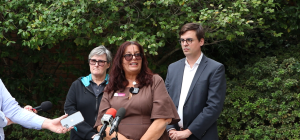New research shows low-income working households might be beginning to catch up on essential living costs, but those on unemployment benefits face ongoing financial hardship as the risk of unemployment continues to grow in Western Australia.
The Cost of Living Report 2015, released today by the WA Council of Social Service, shows that government support for a model unemployed single person failed to cover their living costs during the last financial year, leaving them nearly $50 short of meeting their necessary expenditure each week.
“Support for unemployed Western Australians including the Newstart Allowance and Commonwealth rent Assistance is simply insufficient to cover basic costs, comprehensively failing to keep up with the growth of both the minimum wage and average weekly earnings in our state.” said Irina Cattalini, CEO of WACOSS today.
“Cost of living pressures for low-income working families have seen some gradual improvement over the last year, where they are able to maintain work. However rising unemployment, underemployment and increasing workforce casualisation places many in a precarious position.”
“Those who were able to secure two sources of adequate income over the past year were in a better position, but we know that for a small but growing number, that is becoming harder to guarantee,” said Ms Cattalini.
“Low income single parent households were only just able to cover their living costs, which left them with no ability to save or to respond to an unexpected cost or crisis. We are particularly concerned that the Federal Government’s proposed cuts to Family Tax Benefit B will have a profoundly negative impact on many low-income working households.”
“The biggest single factor in the easing of essential living costs in our modelling is the fall in median rental prices, with rent accounting for more than 30% of expenditure for our model households,” she said.
“We need to be cautious in how we interpret these results, as the median rental price only reflects the value of new rental contracts rather than ongoing ones. With evidence such as the Anglicare rental affordability snapshot showing there are few places on the market affordable for those on low incomes, the number able to move to cheaper housing nearby or negotiate cheaper rent is likely to remain small.”
“Looking forward into the new year – with a $99 increase in car registration costs plus increasing utility and public transport costs on the books, the economy remaining soft and unemployment showing no signs of improving, and relatively few affordable rentals on the market – we are not hopeful of seeing any reduction in the rates of financial hardship.”
“During times like these, our focus has to be determining how our limited resources can best be used to assist those most at risk of financial hardship,” concluded MS Cattalini.
Media Contact:
Irina Cattalini, CEO 0422 422 438 or 9420 7222
To download a PDF of this media release, please click here.



